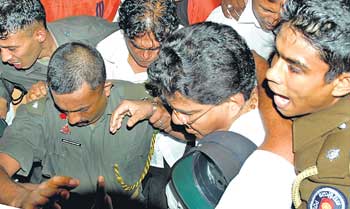
US slams Lanka’s human rights record
The US State Department in its annual country report on human rights practices in Sri Lanka that was released on March 11, said the government's respect for human rights continued to decline due in part, to the escalation of the armed conflict. The Report also said that the LTTE, which maintained control of large sections of the north, continued to attack civilians and engage in torture and arbitrary arrest and detention; denied fair, public trials; arbitrarily interfered with privacy; denied freedoms of speech, press, and assembly and association; and forced recruitment, including recruitment of children.
However the Government came in for much of the criticism in the report. It said that the overwhelming majority of victims of human rights violations, such as killings and disappearances, were young male Tamils and said credible reports cited unlawful killings by government agents, assassinations by unknown perpetrators, politically motivated killings and child soldier recruitment by paramilitary forces associated with the government, disappearances, arbitrary arrests and detention, poor prison conditions, denial of fair public trial, government corruption, a lack of transparency, infringement of religious freedom, infringement of freedom of movement, and discrimination against minorities. The report said “there were numerous allegations that the army, police, and pro government paramilitary groups participated in armed attacks against civilians and practised torture, kidnapping, hostage-taking, and extortion with impunity. The situation deteriorated particularly in the government-controlled Jaffna peninsula. By year's end extrajudicial killings occurred in Jaffna almost on a daily basis and were allegedly perpetrated by military intelligence units or associated paramilitaries,” the report added, It added that there were few arrests and no prosecutions as a result of these abuses, although a number of older cases continued to make slow progress through the judicial system. Government security forces used the broad 2005 emergency regulations to detain civilians arbitrarily, including journalists and members of civil society.During the year approximately s1,000 of the estimated 3,200 deaths associated with the hostilities between government security forces and the LTTE were civilians, according to public sources. International organizations have documented approximately one-third of these. There were numerous killings of those employed by NGOs and other humanitarian assistance workers. UN Under-Secretary-General for Humanitarian Affairs John Holmes estimated that approximately 30 NGO workers died in the past two years, although NGO sources estimated the figure to be approximately 44. On June 3, for example, men dressed in police uniforms abducted two Tamil employees of the Sri Lanka Red Cross from the Colombo train station, a high security area. The Red Cross employees' bodies were discovered the following day approximately 100 kilometres away in Ratnapura. The Report also said that the government used paramilitary groups to assist its military forces in fighting the LTTE and intimidate its critics in the media and in parliament. The Report also dealt with the areas of torture and other cruel, inhuman, or degrading treatment or punishment, arbitrary arrest or detention, denial of fair public trial, prison and detention center conditions, role of the police and security apparatus, arrest and detention, trial procedures, political prisoners and detainees, arbitrary interference with privacy, family, home, or correspondence, use of excessive force and other abuses in internal conflicts. The report also dealt with the freedom of speech and the press and said that although the media was generally free to criticize the government, media freedom deteriorated in the conflict-affected north and east, especially in Jaffna, where many journalists were killed, The Report referred to several cases including the December 27 incident at the Rupavahini Corporation where “Minister Mervyn Silva, reportedly upset with the station's failure to carry a story about him, verbally and physically assaulted the Rupavahini news director. Silva's actions provoked a fierce reaction from Rupavahini employees, who responded by assaulting the Minister and his associates,” it said. The report also dealt with the issue of Government Corruption and Transparency and said that according to the World Bank's Worldwide Governance Indicators, government corruption was a serious problem. There was corruption in all three branches of government, as well as various bureaucratic agencies. Transparency International (TI) identified nepotism and cronyism in the appointment of officials to government and state owned institutions. On the Governmental Attitude Regarding International and Nongovernmental Investigation of Alleged Violations of Human Rights, the Report said that a number of domestic and international human rights groups continued to operate despite increasing government restrictions, investigating and publishing their findings on human rights cases. |
|
||||||
|| Front
Page | News | Editorial | Columns | Sports | Plus | Financial
Times | International | Mirror | TV
Times | Funday
Times || |
| |
Reproduction of articles permitted when used without any alterations to contents and a link to the source page.
|
© Copyright
2008 | Wijeya
Newspapers Ltd.Colombo. Sri Lanka. All Rights Reserved. |
